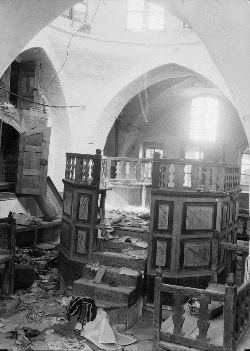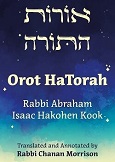The 1929 Arab Riots
On the eleventh of Av, 5689 (Aug. 17, 1929), bloody riots erupted in Eretz Yisrael. Hundreds of Jews were murdered or injured by Arab mobs during these uprisings. Worse hit was the Jewish community of Hebron.
When the riots subsided, rumors spread throughout the Yishuv that the British authorities actually cooperated with the rioters. Accusations pointed specifically to Harry Charles Luke — the son of assimilated, Hungarian Jews (his father immigrated to England where he converted to Christianity). At the time, Mr. Luke served as Secretary General of the British Mandatory Government, and rumor had it that he encouraged the Arabs to murder and pillage the Jews.
I Order You!

During the rioting, Rav Kook called Mr. Luke on the telephone and demanded that he take stiff action against the Arab marauders.
‘What can be done?’ asked Luke. ‘Shoot the murders!’ replied Rav Kook. ‘I have not received any such orders,’ retorted the British official.
“ I order you!” said the Rav. “I demand this in the name of human dignity.”
The Handshake
Sometime later, the heads of the British government in Palestine held a formal reception for the most prominent Jewish figures in the Land. Mr. Luke cordially held out his hand to Rav Kook, but the Rav refused to shake it, saying sternly, “I will not shake a hand stained with Jewish blood!”
Afterwards, Luke said to the Rav: ‘You Jews! Go and defend yourselves, but do not attack others.’ The Rav replied:
“Do not preach to us, you who violate the commandment of ‘You shall not murder'! [Our rule is:] if someone rises to kill you, kill him first.”
The Rav’s bold stance made a profound impression upon the entire Jewish world, as Avigdor HaMe'iri (a writer of the time) testified:
“If not for one unique, extraordinary man, who stood guard over our national and human pride, we would now be rending our garments over the loss of our honor as well.”
News of the Rav’s bold response spread swiftly throughout the Yishuv, creating an uproar wherever it reached. Most people praised his valor, but some criticized it, mainly out of fear that Mr. Luke would take revenge on the Jewish settlements, which were largely at his mercy. Whenever the Rav appeared in public, two opposing groups immediately formed, arguing boisterously for and against the Rav.
The Brit
Around that time, Rav Kook was invited to a brit milah (circumcision). Before the ceremony began, a heated debate broke out over the Rav’s defiant response to the high- ranking officer, who represented the gentile lords of the Land. When the Rav realized what was happening, he signaled to his attendant, R. Meir David Schotland, a clever and learned man, to restore order to the crowd.
R. Meir David rose at once and said emphatically:
“Gentlemen! Very soon, we will usher the newborn baby into the room and bring him into the covenant (brit) of Avraham Avinu. At that time, we will all stand up and welcome him with the traditional greeting of “Baruch HaBa” (‘Blessed is he who arrives').
“I have two questions concerning this practice. First, why don’t we greet a bar-mitzvah boy or a bridegroom in the same fashion? They at least would understand the meaning of our blessing, while the uncircumcised child surely does not. Second, why don’t we bid farewell to the child after the circumcision by saying, “Baruch HaYotzei” (‘Blessed is he who leaves')?
Silence hovered over the crowd, as R. Meir David continued his words:
“The answer to these questions is quite simple. Sadly and shamefully, we Jews admire every uncircumcised Gentile we meet, taking every opportunity to show him respect, whether it is necessary or not. Therefore, when the yet uncircumcised child enters the room, we honor him by standing up and proclaiming “Baruch HaBa". However, after he is circumcised and becomes part of the Jewish people, we no longer show him any special respect — no “Baruch HaBa” and no “Baruch HaYotzei"'.
It was clear towards whom R. Meir’s words were directed. Rav Kook had dauntlessly stood up to a distinguished Gentile, publicly condemning representatives of the Mandatory Government for cooperating with the Arab rioters, and there were actually people who criticized him for this!
(from An Angel Among Men by R. Simcha Raz, translated by Rabbi Moshe Lichtman, pp. 191-194)





